Dr. Shivaji Argade and Mr. Alagu Niranjan participated in a 21-day online training programme organized by ICAR-NAARM, Hyderabad. Their first online training experiences are shared here.
 CONTEXT
CONTEXT
Agricultural extension research is an intensive scientific inquiry into socio-economic problems faced by all stakeholders involved in agriculture and involves providing timely solutions. But the validity and reliability of extension research outputs are always questioned and have often failed to attract stakeholder attention. Therefore, reorienting extension research and evaluation through innovative practices is the matter of priority in order to achieve desired developmental goals and targets. Keeping this in view, a 21-day (08-28 September, 2020) virtual training programme “Innovative Practices in Extension Research and Evaluation (IPERE)” was organised for developing competitive abilities of extension professionals to be able to conduct valid and reliable extension research and evaluation.
A diverse mix of 59 participants comprising practising professionals and research scholars from 19 states of India participated in the 21-day online training programme. Information pertaining to presentations and activities scheduled for the week were shared through regular e-mails. A WhatsApp group was created for workshop participants and organisers.
INAUGURAL SESSION
The programme was inaugurated by Dr. Ashok Kumar Singh, Deputy Director General (Agricultural Extension), ICAR, New Delhi, who emphasized the need for extension research in the present scenario. He envisaged developing sound methods and models for helping field level functionaries in effective delivery of extension services. Highlighting the need for a “rigorous approach” in advancing the extension science, Dr. Ch. Srinivasa Rao, Director, ICAR-NAARM, Hyderabad, urged to look into the “mechanics” of conducting extension research. Dr. S. K. Soam, Joint Director, ICAR-NAARM, Hyderabad, emphasized educating the educators and trainers about improving delivery mechanism in online training and extension programmes. The programme was coordinated by Dr. P. Venkatesan, Dr. Bharat S. Sontakki, Dr. N. Sivaramane and Dr. Surya Rathore, scientific faculty from ICAR- NAARM.
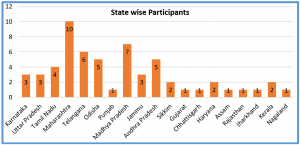 State wise distribution of participants in IPERE online training
State wise distribution of participants in IPERE online training
DESIGN OF VIRTUAL TRAINING
The 21-day virtual training was planned in two distinct modules i.e., starter kit and pathfinder kit. The starter kit included introductions, overview, basic concepts of extension research, data collection, data analysis and evaluation research. The pathfinder kit included emerging trends in extension research, publications for influencing policy and practice and learning internalization. The training comprised 28 technical sessions and three group exercise sessions. There were two sessions of two hours daily i.e., one each in forenoon and afternoon. There were almost equal number of hours and sessions spent on practical and theory. Theory class was always followed by a practical session. Based on the number of participants, ten groups were formed (six participants in each group) during initial training sessions. The group exercise involved preparation and presentation of concept note on any topic based on the learnings from the training. After every theory session, the groups were directed to breakout rooms in Google Meet or Zoom platform for the group exercise. The presentations of these group works were scheduled for the last three sessions of the training.
TECHNICAL SESSIONS
THE STARTER KIT SESSIONS (17 Sessions)
The first session was Extension: current status and future prospects by Dr. Bharat Sontakki, HoD, Extension Systems Management Division, ICAR-NAARM, Hyderabad. It was an eye-opener of a session for extension professionals where Dr. Sontakki focused on current status of extension research methods and practices followed by how extension professionals get equipped with innovative methods and practices in extension research in order to bring visibility to research outputs. In the second session, Dr. Ch. Srinivasa Rao, Director, ICAR-NAARM, Hyderabad, highlighted farm innovations for transformation from different parts of country. It was thought provoking for the participants and urged them to go beyond extension research to looking at grassroots level farm innovations that need to be refined and commercialized. The third session was presented by Dr. V. P. Chahal, ADG (AE), ICAR, New Delhi, on Priority Areas of Extension Research. He described in detail the history of extension research, extension research process, seven institutional levels where extension research is conducted, major themes under which extension research has been conducted, researchable issues with respect to doubling farmers income-2022, strategies for finding current research topics, thrust areas of extension research and strategies for improving extension research in India.
Sessions 4, 5 and 6 covered research questions, types of research, objectives, hypotheses, concepts and constructs; research designs for extension research and structural equational modelling: overview and demonstration. Dr. P Sethuraman Sivakumar, Principal Scientist, ICAR-CTCRI, Thiruvananthapuram handled these sessions. He stressed upon theory development in extension research. He mentioned checklists for identification of exact research problem and formulation of research question and objectives to get desired outputs. He also explained hypotheses, concepts, constructs, variables and research designs with suitable examples. The practical sessions were conducted using ‘R’ software. Sessions 7, 8 and 9 were presented by Dr. A. Dhandapani, Principal Scientist, ICAR-NAARM, Hyderabad, on sampling methods, sample size estimation and statistical designs for data analysis in extension research and multivariate techniques (factor analysis). He highlighted the importance of selecting suitable sampling method and research designs, key points for selecting sampling method and estimating sample size under different situations. The practical session was conducted on statistical analysis of data through different multivariate techniques using ‘R’ Software.
In session 10, Dr. D. Thammi Raju, Principal Scientist, ICAR-NAARM, Hyderabad, discussed data sources and data collection methods. He demonstrated authenticated sources for collecting secondary data. He also mentioned key points for selecting suitable primary data collection methods under different circumstances. The case study approach in extension research was covered by Dr. S. P. Subash, Scientist, ICAR-NIAP, New Delhi, in session 11. He described how best we can collect scientific information by using case study method and write good research papers. Sessions- 12 and 13 were delivered by Dr. N. Sivaramane and Dr. B S Yashavanth on the use of ‘R’ software for data analysis. These were entirely practical sessions and demonstrated how to descriptive statistics can be analysed using different commands in ‘R’. Session 14 covered correlation and regression by Dr. S. Ravichandran. He discussed differences in correlation & regression, when to use correlation and regression and practical data analysis of correlation and regression using ‘R’.
Session 15 was delivered by Dr. N Sivaramane, Principal Scientist, ICAR-NAARM, Hyderabad, on non-parametric statistical tests for extension research. He highlighted the importance of non-parametric tests in social science research, different non-parametric tests (Mann-Whitney U test, Wilcoxon Rank Sum Test, Kruskal Wallis Test, Friedman test and Spearman Correlation), when and how to select suitable non-parametric tests to analyse data. The practical session was also conducted on analysing data through different non-parametric tests using ‘R’ software. In session 16, Dr. Surya Rathore, Principal Scientist, ICAR-NAARM, Hyderabad, discussed programme evaluation-concepts, designs and methods in which she talked about different evaluation and impact assessment models in social sciences, evaluation and impact assessment indicators in extension programmes and how effective evaluation and impact assessment can be done in the field. The last starter kit session 17 was presented by Dr. P. V. K. Sasidhar, Professor, School of Extension & Development Studies, IGNOU, New Delhi, on Good practices in evaluation research: Experience sharing. He started the presentation with card exercise on current practices in evaluation. He briefed about scope and importance of evaluation studies using different case studies. He also shared his own experiences in conducting evaluation study on contract broiler farming using Benett’s Hierarchy model.
THE PATHFINDER KIT SESSIONS (11 Sessions)
Session 18 was delivered by Dr. V. K. J. Rao, Principal Scientist, ICAR-IIHR, Bengaluru, on PRA as research tool in social sciences. He covered the importance of PRA and different PRA tools for collecting qualitative and quantitative data in extension research. In session 19, Dr. P Venkatesan, Principal Scientist, ICAR-NAARM, Hyderabad, presented Thematic Analysis. He briefed about different approaches to thematic analysis and use of NVivo software for identifying, analysing and interpreting patterns of meaning/themes within qualitative data. In session 20, Dr. Mahantesh Shirur, Deputy Director (Agricultural Extension), MANAGE, Hyderabad, explained different scaling techniques in extension research using field examples. Session 21 was about application of AHP in extension research by Dr. S. K. Soam, Joint Director, ICAR-NAARM, Hyderabad. It is an online tool that facilitates group decision making by pairwise comparison based on expert judgment values. It can be used for Project Prioritization, Priority Setting, Research Project Monitoring and Evaluation (PME) and also for Technology Valuation and Technology Management by extension professionals. It was followed by a practical session on use of AHP analyser.
In session 22, Dr. N Sivaramane, Principal Scientist, ICAR-NAARM, Hyderabad, presented Conjoint Analysis. He discussed the effectiveness of tool, different steps in conjoint designs, types of conjoint designs and analysis. This was followed by a practical session on conjoint analysis syntax in SPSS. Session 23 was delivered by Dr. D. Thirunavukarasu, Associate Professor, KVK, Villupuram-II on meta-analysis for evidence-based policy advocacy. He explained challenges for drawing conclusion from research literatures, how researchers sum up or consolidate research findings using meta-analysis. He introduced us to the steps in meta-analysis by citing different examples, different methods of meta-analysis like vote counting & models of meta-analysis, how to do meta-analysis using statistical software like MS Excel. Session 24 was presented by Dr. Sreeram Vishnu on Social Network Analysis (SNA), background and theoretical framework of SNA, typology of social network relationships, network properties, SNA applications and network visualization using open access software NetDraw. In session 25, Dr. S Prabhu Kumar, Former Director, ATARI Bengaluru and Ludhiana, discussed extension approaches in technology application. He stressed upon technology application role of extension professionals and participatory impact assessment approach in extension.
In session 26, Dr. V Rasheed Sulaiman, Director, Centre for Research on Innovation and Science Policy (CRISP), Hyderabad, delivered a talk on writing evidence-based policy papers in high impact factor journals. He focused on both journal and non-journal publishing. He shared a manual on good practices in extension research and evaluation which is developed by AESA, NAARM, CRISP, CTCRI and MANAGE. It is a good resource material for young researchers for selecting the right research methods for conducting quality research and evaluation in extension. He also showed the way beyond research paper publications in journals. He emphasized different forms of research publications other than research articles like policy papers, policy briefs, working papers, blogs and research reports, etc. In session 27, there was a panel discussion with editors (Dr. Sumati Gautam, Dr. P. Joshi, Dr. S. K. Singh, Dr. K. Ponnusamy and Dr. Aruna) of different research journal like Journal of Environmental Biology, Indian Journal of Extension Education, Indian Journal of Agricultural Sciences, Indian Journal of Animal Science, Journal of Dairy Science, etc. The panelists answered practical questions raised by participants on writing acceptable research articles, increasing the chance of acceptance by a journal, the thrust areas for journals and other practical issues one may face during research article submission including delayed responses, reasons for rejection, etc. Session 28 was delivered by Dr. P. Venkatesan, Principal Scientist, ICAR-NAARM, Hyderabad, on Indigenous Technical Knowledge (ITK). He highlighted the importance of ITKs, documentation of ITKs, scientific validation of ITKs, methods of ITK validations, etc.
GROUP EXERCISE SESSIONS
In sessions 29, 30 and 31, participants from ten groups presented their research concept note in diverse thematic areas like psychometric/scaling, gender and nutrition, adoption and diffusion research, organization and management, programme evaluation, impact assessment, digital disruptions, institutional innovations, livelihood/vulnerability assessment and entrepreneurship/marketing.
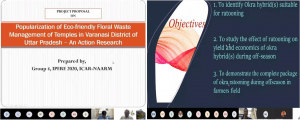
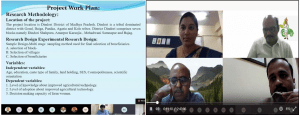
VALEDICTORY SESSION
The valedictory session began with a welcome address by Dr. Bharat Sontakki followed by Dr. P. Venkatesan, who presented a brief report of the 21-day online training programme, which was followed by feedback from participants on learning and impressions about training. Dr.Ch. Srinivasa Rao, Director, ICAR-NAARM, Hyderabad, urged to look into the quality of research conducted by SAUs extension. He emphasized the need for compassion in research to identify real time researchable problems. Dr. S. K. Soam, Joint Director, ICAR-NAARM, Hyderabad, emphasized improving delivery mechanisms in online training and extension programmes. The Chief Guest, Dr. J. P. Sharma, Vice-Chancellor, SKUAST-Jammu, congratulated the training team and mentioned that the conception of innovative ideas is very essential for any kind of R & D activity. He emphasized identification of grassroots problems faced by farmers and design solutions accordingly to make extension research more accountable. He also highlighted critical farm issues like decreasing per capita land availability, increasing unemployment, etc. in the backdrop of the Atmanirbhar Bharat movement. He urged extension professionals to work for making India’s farmers Atmanirbhar (self-sufficient). The vote of thanks was presented by Dr. Surya Rathore.
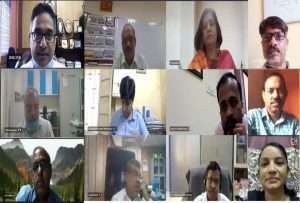
Key takeaways from the training
- Compassion is the key to wellbeing (apply it in your research, you will find wonders).
- Theory is everything. You can add knowledge to existing theories or you build a new theory by researching.
- Build on a foundation of trust: scientific method & research paradigm
- Purpose of social research is to improve the situation; not improving one self’s profile
- Do not write proposals in place of hypotheses.
- Sample size must be determined based on the characteristic of a variable and its variability.
- Anything can be learned if you show interest; here I learned R (not fully, at least installed, opened and made attempt to create directory)
- There are theories for measurement approaches themselves (astonished).
- Treat farmers as your partners, not beneficiaries.
- Read more to write well and there are different ways of writing required for different type of documents.
WHAT WE LEARNT
The first thing we learnt was that we cannot use yesterday’s techniques today and be in the business tomorrow. There are many innovative practices and methodologies that exist to make extension research more accountable. However an extension professional should break the inertia and increase their competencies by learning innovative methodologies and applying them to solve real time research problems. The key learnings from the training are:
1. Developing winning research proposals
2. Advanced statistical tools and techniques as well as statistical software
3. Writing research articles for high impact factor journals
4. Priority research areas in agricultural extension
OUR IMPRESSIONS
This is the first time we attended an online training. The experience was quite good in terms of time flexibility, physical stress, etc., as compared to offline training. We feel that the programme schedule was much more flexible as compared to tightly scheduled offline training programmes. The course content was robustly covered and efficiently managed in terms of time and resources. The online group exercise was a unique experience. The groups contributed actively in the exercise though there was limited of physical one to one interaction. Online theory and practical sessions reduced physical and mental stress. We enjoyed the exercise from our place of comfort. We felt more enthusiastic and productive during the exercises. All group members contributed equally and participated actively. The training programme was on innovative practices in extension research and was managed and executed in an innovative and friendly way. It was very refreshing, knowledge enriching, thought triggering and competency building. Surely, we recommend frequent organisation of such kind of trainings for extension professionals.
“We are grateful to ICAR-NAARM for organising a need based online training programme and we will continue to use the methodological tools taught in our research activities.”
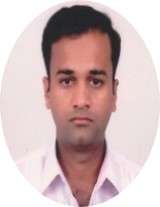 Dr. Shivaji Argade, Scientist (Agril. Extension), ICAR-Central Institute of Fisheries Education, Mumbai (e-mail: shivaji@cife.edu.in)
Dr. Shivaji Argade, Scientist (Agril. Extension), ICAR-Central Institute of Fisheries Education, Mumbai (e-mail: shivaji@cife.edu.in)
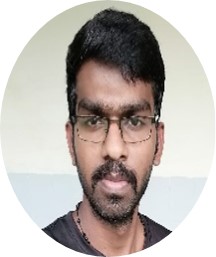 Mr. Alagu Niranjan D, PhD Research Scholar (Agricultural Extension), ICAR-National Dairy Research Institute, Karnal, Haryana (e-mail: dan131995@gmail.com)
Mr. Alagu Niranjan D, PhD Research Scholar (Agricultural Extension), ICAR-National Dairy Research Institute, Karnal, Haryana (e-mail: dan131995@gmail.com)

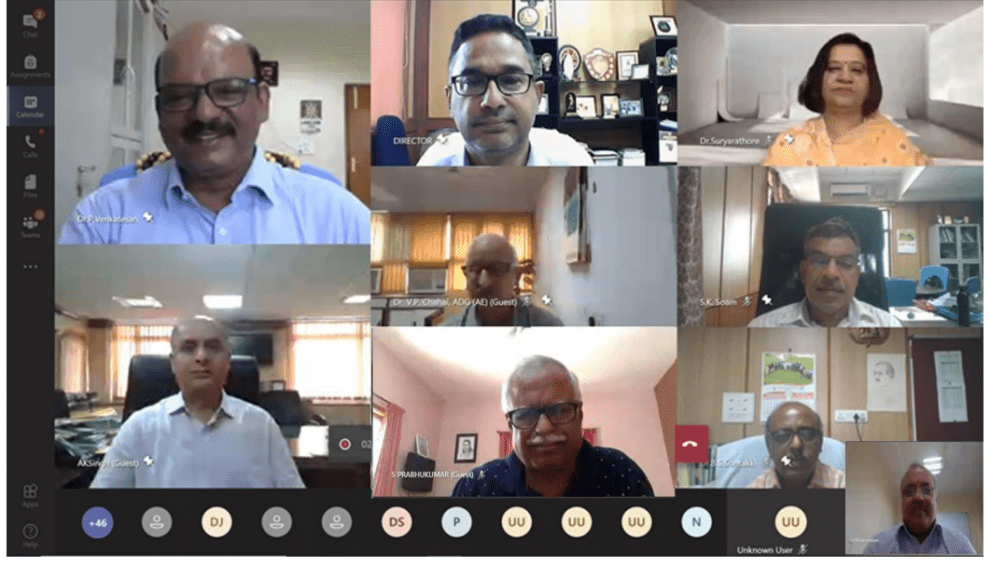

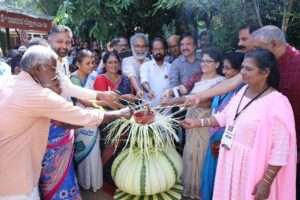

Well written, Dr. Shivaji and Mr. Niranjan. Congratulations. Keep doing good work.